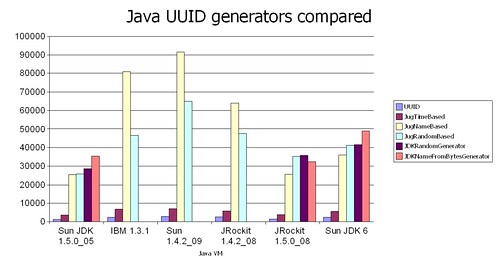Java UUID generators compared
Posted 2007-04-25 in Java by Johann.
UUIDs (or GUIDs) are unique identifiers that are frequently used in programming. In this entry, I will compare three generators of UUIDs written in the Java programming language.
Possible uses for UUIDs
UUIDs have a variety of uses, including
- Temporary file names.
- Unique identifiers for website visitors.
- Transaction IDs.
- Primary keys, replacing database sequences.
Generally, whenever unique values across different machines are needed, UUIDs are a good choice.
The contestants
The following packages were compared:
- UUID – my own implementation.
- Java UUID Generator.
java.util.UUID, available since JDK 5.
I did not compare the following packages:
- The implementation found in Jini.
- Commons Id – there is no release as of now.
The features
I compared the following features:
- Ease of use: How many lines of code does it take to get a UUID?
- Versions: The UUID versions supported (1–5).
- Speed: The performance of generating UUIDs.
- EJB: Whether the generated UUIDs can be used as primary keys in enterprise java beans.
- CORBA: Whether the generated UUIDs can be used in CORBA.
- Parse: Whether parsing UUIDs is supported. Usually, this is done from
java.lang.Strings, although JUG also supports parsing frombytearrays.
The results
Name |
Ease of use |
Versions |
Speed |
EJB |
CORBA |
Parse |
|---|---|---|---|---|---|---|
++: very good, +: good, o: acceptable, -: bad, --: very bad |
||||||
UUID |
++ |
1 |
++ |
Yes |
Yes |
|
JUG |
o |
1, 3–5 |
+/-/-- |
No |
No |
|
JDK 5 |
++ |
3, 4 |
-/-- |
No |
No |
|
The benchmark
The performance of all generators was compared. The test computer was an Intel Pentium M 1.73 GHz computer with 1.5 GB of RAM. Load on the computer was low during the tests.
The following Java Virtual Machines were used:
- Sun JDK 1.5.0_05
- IBM 1.3.1
- Sun 1.4.2_09
- BEA JRockit 1.4.2_08
- BEA JRockit 1.5.0_08
- Sun JDK 6
All Java Virtual Machines were started with -Xms256M -Xmx256M to force a fixed VM size.
The data
The following table contains the timings in milliseconds for the creation of one million UUIDs with the various implementations.
VM |
UUID |
JUG, time |
JUG, name |
JUG, random |
JDK, random |
JDK, name |
|---|---|---|---|---|---|---|
Sun 1.5.0_05 |
1315 |
3424 |
25518 |
25946 |
28565 |
35253 |
IBM 1.3.1 |
2359 |
6796 |
81134 |
46584 |
||
Sun 1.4.2_09 |
2800 |
7053 |
91569 |
64956 |
||
JRockit 1.4.2_08 |
2556 |
5859 |
63890 |
47500 |
||
JRockit 1.5.0_08 |
1431 |
3756 |
25653 |
35093 |
35797 |
32253 |
Sun JDK 6 |
2303 |
5703 |
35968 |
41100 |
41553 |
48859 |
My own implementation is the fastest by a factor of at least two. With a modern computer, it is possible to generate more than 500.000 UUIDs per second.
The good
All of the implementations I tested generated unique UUIDs, even when used multi-threaded.
The bad
Some of the implementations are slower than others. It might not be possible to use some implementations in environments like EJB containers.
The MAC address issue
The computer’s MAC address must be encoded into a version 1 UUID. Because there is no official way in Java to do this, JUG comes with a native library (compiled for Windows x86, FreeBSD, Linux x86, MacOSX PPC, SPARC). My own version does this without native code (tested on Windows, Linux, MacOSX, BSDs, Solaris, HP-UX) and falls back to random data if the MAC address cannot be read.
Security aspects must be considered when version 1 UUIDs that contain the MAC address are made public.
The summary
If you need speed and/or support for EJBs or CORBA, UUID is the best way. If security is of ultimate importance to you, it cannot be used. In that case, JUG in the time-based mode is a good choice.
2 comments
#1 2010-03-04 by CarlosOrtiz
Can you please send me the info Jethro and unmesh asked for?
"how to prevent concureny program on multi-Jvm on same machine from generating same uuid?"
I also would like to know the answer of:
Can (userid + transaction type + timestamp) a reliable approach to generate unique id for transaction in web applications where user has to log in before performing any transaction and no two users can have same ids?
Carlos,
in addition to the MAC address, there's also 16 bits of randomness in each UUID.
Concerning your second question, I wouldn't use the transaction type, no matter what it is, because I assume a very uneven distribution. You might be happy with something like(userid + shared AtomicLong#incrementAndGet()).
But then, create a multithreaded test for your implementation, add all IDs to a List and see if you get duplicates.
Subscribe
RSS 2.0, Atom or subscribe by Email.
Top Posts
- DynaCloud - a dynamic JavaScript tag/keyword cloud with jQuery
- 6 fast jQuery Tips: More basic Snippets
- xslt.js version 3.2 released
- xslt.js version 3.0 released XML XSLT now with jQuery plugin
- Forum Scanners - prevent forum abuse
- Automate JavaScript compression with YUI Compressor and /packer/
